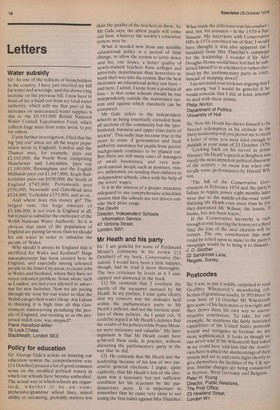Mr Heath and his party
Sir: I am grateful for some of Ferdinand Mount's comments in his review (13 October) of my book, Conservative Dissidents. I would have been a little happier, though, had he read it more thoroughly. The two criticisms he levels at it I anticipated and answered in the book.
(1) He contends that I overlook the merits of the measures pursued by Mr Heath. In my preface, I state quite clearly that my concern was the attitudes held within the parliamentary party to Mr Heath's policies, and not the intrinsic qualities of those policies. As I point out, 'it could be argued in Mr Heath's defence that the results of his policies while Prime Minister were necessary and valuable'. My later argument is that Mr Heath could have achieved these ends, in practice, without alienating the parliamentary party in the way that he did.
(2) He contends that Mr Heath lost the leadership because of his loss of two successive general elections. I argue, quite explicitly, that Mr Heath's loss of the elections was a necessary but not sufficient condition for his rejection by the parliamentary party. It is important to remember that he came very close to not losing the first ballot against Mrs Thatcher. What made the difference was his conduct — and, yes, his manners — in the 1970-4 Parliament. My interviews with Conservative MPs in 1974 convinced me of that; I would have thought it Was also apparent (as I mention) from Mrs Thatcher's campaign for the leadership. I wonder if Sir Alec Douglas-Home would have lost had he subjected himself to re-election (or rather election) by the parliamentary party in 1965, instead of stepping down? I do not mind your reviewer arguing that I am wrong, but I would be grateful if he would concede that I did, at least, attempt to deal with these points.
Philip Norton Department of Politics, UniversitY of Hull Sir: Now Mr Heath has shown himself to be beyond redemption in his attitude to the party leadership will you permit me to recall a letter of mine you were kind enough to publish in your issue of 23 October 1976: 'Looking back on his record as prime minister Mr Heath's speech at Brighton was surely the most impudent political discourse of the century — no mean feat when one recalls some performances by Harold Wilson.
'The fall of the Conservative Government in February 1974 and the party's failure to regain power eight months later were due to the middle-of-the-road voter disliking Mr Heath even more than he (or she) distrusted Mr Wilson; the lesson, it seems, has not been learnt.'
If the Conservative hierarchy is rash enough to risk learning the lesson yet a third time the loss of the next election will be certain. The one contribution this man could be relied upon to make to the party's campaign would be to bring it to disaster. J. D. Godber 22 Sandcross Lane, Reigate, Surrey






































 Previous page
Previous page